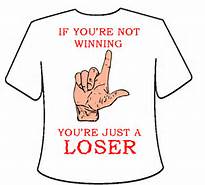
The TED Talk we watched really opened my eyes to why tragedy would've been a great source of ancient entertainment. In the TED talk, the speaker shined a new light on tragedies past and how folks' belief systems made them view tragedy differently. By placing misfortunes blame on Gods and other figures of divinity, people of the ancient world viewed those who were placed in situations like poverty or infidelity were not "losers" just people who had lost. Modern society has evolved from this view point though. We now see blame placed entirely on ones self, and not really upon the fates at all. This twists our view of tragic themes like poverty and infedelity. Placing the blame on only ourselves doesn't allow us to view tragedy in the way of those who came before us because we've moved on from the Gods!
Then where is our "fate" and success decided? Ourselves? I tend to think largely no. Though we have to physically do it ourselves, I think that society plays a large role in how we determine our own success. In our time, unless you're moving and shaking, making bank really, you may not be considered to be much. To not achieve, is ultimately to fail. We've drawn such a thin line between our concepts of "failure" and "success" that really there is little room left to be average. Climb high or be lost is the growing trend.
A moment of clarity came to me when I was thinking about this notion, society and success. How does that relate to tragedy? It IS how we define tragedy! We equate whatever society thinking of us as our definition of succeeding. If we are not striving to be a cut throat business exec., society deems us lazy or not reaching our full potential. For example, society is pushing kids to go into math and science fields and if they don't they're automatically failing society's standard of success. Another way of looking at it is something familiar to me, high school grades. I don't get A's in math class, I never have! But I do my best, work my hardest, and eventually pull out a B+ I'm pretty proud of. Some people have looked down on me for not acing my honors level math, but I choose not to let these other people tell me my hard earned B+ isn't success. This relates to tragedy because if society deems your own down fall is a failure, and not tragedy, you aren't pitied you're scorned. By letting the majority at large decide what our success and failures are, we let them limit the way we differ what used to be considered tragic and is now considered failures. In the TED talk the speaker challenged us probe our own notions of success. I'd like to also think that was a way to perhaps explore and reevaluate my views of the modern tragedy in comparison to what was once considered tragic.
Then where is our "fate" and success decided? Ourselves? I tend to think largely no. Though we have to physically do it ourselves, I think that society plays a large role in how we determine our own success. In our time, unless you're moving and shaking, making bank really, you may not be considered to be much. To not achieve, is ultimately to fail. We've drawn such a thin line between our concepts of "failure" and "success" that really there is little room left to be average. Climb high or be lost is the growing trend.
A moment of clarity came to me when I was thinking about this notion, society and success. How does that relate to tragedy? It IS how we define tragedy! We equate whatever society thinking of us as our definition of succeeding. If we are not striving to be a cut throat business exec., society deems us lazy or not reaching our full potential. For example, society is pushing kids to go into math and science fields and if they don't they're automatically failing society's standard of success. Another way of looking at it is something familiar to me, high school grades. I don't get A's in math class, I never have! But I do my best, work my hardest, and eventually pull out a B+ I'm pretty proud of. Some people have looked down on me for not acing my honors level math, but I choose not to let these other people tell me my hard earned B+ isn't success. This relates to tragedy because if society deems your own down fall is a failure, and not tragedy, you aren't pitied you're scorned. By letting the majority at large decide what our success and failures are, we let them limit the way we differ what used to be considered tragic and is now considered failures. In the TED talk the speaker challenged us probe our own notions of success. I'd like to also think that was a way to perhaps explore and reevaluate my views of the modern tragedy in comparison to what was once considered tragic.

 RSS Feed
RSS Feed